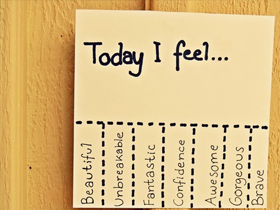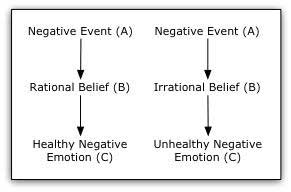
Many of us are not taught about how to understand our emotions. Yet this ability is one of the most crucial skills when it comes to our mental health and decision making abilities. Understanding what your emotions are trying to tell you is crucial to your emotional health. This post offers a simple process for you to accomplish this. (Estimated reading time: 5 minutes)
“Emotions make us human. Denying them makes us beasts.”
— Victoria Klein
Have you ever…
- teared up while watching a touching movie scene?
- felt angry while viewing news coverage on a senseless act of violence?
- experienced elation after hearing about your job promotion or pay raise?
- been excited while planning a fun-packed vacation?
- felt a sense of peace while watching a sunset on the beach?
If you answered yes to any of these questions, then you know what an emotional experience feels like.
We all experience a wide range of emotions during our lifetimes, and will continue to do so till our last breath, because emotions are fundamental to our nature.
But what exactly are emotions and what purpose do they play in our life?
According to Science Daily, emotion is “a neural impulse that moves an organism to action, prompting automatic reactive behavior that has been adapted through evolution as a survival mechanism to meet a survival need”.
Compared to the reactive responses of reptiles, the emotions that mammals experience are more elaborated responses of the general arousal patterns caused by major neurochemicals (dopamine, serotonin and adrenalin).
These chemicals step up or step down the level of brain activity and cause physiological changes like a faster heartbeat, varied facial experience, and changes in behavior patterns.

The scientific explanation for how emotions are generated within us is simple in theory, but working through them is anything but simple. Unlike reptiles and other mammals, we have an advanced form of intelligence that arises from the complex neural connections within our brain.
Our emotions are significantly influenced by our thoughts. Psychologist Albert Ellis believes that, if we aren’t careful, our thoughts can create a personal reality that’s not conducive to our wellbeing
He demonstrates this through the “A-B-C” model of emotions, which shows how our beliefs and thoughts influence our feelings:
A: Activating event (a friend turns you down for dinner)
+B: Belief (no one likes me)
=C: Consequence (sad mood, feelings of rejection)

According to this model, if you’d like to change your emotional experience, you need to change the way you think. You have to scrutinize your beliefs and challenge them by questioning their validity.
For instance, in the given example, you might want to question the belief that “no one likes me” by looking for proof for this belief. Is it really true that no one likes you? What’s causing you to feel this way?
Yet most of us are prone to impulsive and knee-jerk reactions because we weren’t taught the art of responding to circumstances in a calm and thoughtful way. Both parents and educators don’t pay nearly enough attention to the development of emotional maturity in kids.
Without this guidance, little kids grow into adults who lack the language and the understanding needed to deal with emotions in an appropriate way.
As a result, they may numb their feelings by overeating, overworking, getting addicted to substances, and several other ways. Pent-up emotions can also manifest in the form of stress, angry outbursts and violence.
There is, however, a big price to pay for repressing our feelings. When they aren’t channeled in a healthy way, emotions become toxic within our system. Fear-based emotions such as anger, hatred and regret can cause chronic damage to the body, especially to the immune system.

The good news is that we can befriend our emotions and overcome our fear of diving into the deeper end of the pool, if we’re open to it. We’ll find that our feelings are valuable guideposts that can give us an accurate insight into how to live more fulfilling and purposeful lives.
Although we can’t always change or control our emotions, we can learn how to manage them from a centered place of awareness.
Here’s a simple three step process for deciphering your emotions:
1. Diffuse your emotions if you need to: During incidents when you feel particularly emotional and vulnerable (mostly right after an activating event), it’s best to first walk through the gray clouds and feel the emotions rather than avoid them. At this stage, you need to take a time-out and engage in self-nurturing practices such as writing in a journal, meditating, praying, or speaking with a loved one or trained professional to help channel this energy, so that you can regain your composure and balance.
2. Question your thoughts and beliefs: Once your thoughts are clearer, you’ll be able to perceive your feelings objectively. Going back to the A-B-C model of emotion, you’ll need to examine whether it was the activating event, your interpretation of the event or a combination of both that led to how you feel. For example, if someone at work criticized a project you were working on and you felt offended, ask yourself why you felt hurt.
Did you believe that there’s some truth in their criticism? Perhaps deep down inside, you’re insecure about your work. Maybe your project really does need some improvement and your co-worker was simply trying to provide constructive feedback.
3. Keep the positive vibes on repeat mode: Not all emotions we experience are negative. It helps to take note of all the times when you experienced lighthearted and joyful feelings. Do you have more fun with a specific person or group? Do you get more pleasure from indulging in certain hobbies? When we know what works for us, we should try to bring more of those elements into our future experiences.
For example, I know that I love attending shows and concerts. There’s something magical about the world of theater and music that appeals to my senses and soul. That’s why whenever I’m at home or during my travels, I make a point to pencil in a theatrical or musical experience in my itinerary.
According to the scriptures of the Course in Miracles, every single emotion we choose to experience will ultimately take us down the path of either love or fear. When we walk down a path of love, our life will blossom, just like a beautiful rose with the sweet fragrance of love and harmony.
All my best on your journey,
Seline

Question for you: Have you had a tough time understanding what your emotions are really trying to tell you? What can you do differently?
Did you like this post? Sign up below and I’ll send you more awesome posts like this one every week.

“Emotions make us human. Denying them makes us beasts.” That is so powerful Seline!
I know a few people who need to read this blog. They need to understand how important emotions are and how dangerous it is when we ignore them and try to suppress them. There is nothing wrong with feeling angry or sad or happy. We are not like Spock- we have emotions, it is what makes us human!
Thanks for this reminder.
Wilma
I’m glad you agree Wilma. Definitely share this article with your friends if you think it will help them. Thanks! -Seline